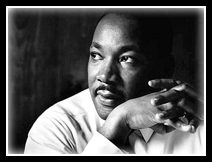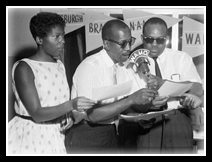-
Black History Month - Part IV
February 22, 2011
Have an opinion? Add your comment below. African-America With Its Top Down
-
African-America With Its Top Down
 As we wrap up our current series for Black History Month 2011, we want to take a look at African-America with the top down -- where history is constantly being made and written about … from America's foremost civil rights heroes to those who share in non-violent struggle for social justice.
As we wrap up our current series for Black History Month 2011, we want to take a look at African-America with the top down -- where history is constantly being made and written about … from America's foremost civil rights heroes to those who share in non-violent struggle for social justice.In creating that legacy of Rev. Dr. Martin Luther King Jr., whose birthday we celebrated last month, we proved that it was possible to have a black leadership group that spoke with one voice. Unfortunately for many today in 2011, Black America no longer has that oneness. For others, it has been hard to let that golden moment slip away. But we must let it go, otherwise we will be forced to cling to a comfortable illusion rather than face a much more complicated reality.
As we conclude this series for Black History Month -- a month in which we bear witness to the progress, richness and diversity of African-American achievement -- let's step back to August 1619, when a Dutch ship sailed into the harbor of Jamestown, Virginia, with a cargo of "black gold" … 20 Africans. The colonies had officially entered the slave trade. And from even these tragic beginnings, black people had an immediate impact on the birth, growth and development of the colonies into the world power the United States has become.

One early achiever was Crispus Attucks, a black man who was the first to fall in young America's struggle for independence. There were others, such as Benjamin Banneker, who aided in the designing of the nation's Capitol building and the city of Washington D.C. From these humble beginnings, the contributions of African-Americans continued. They were many and varied.
Since 2000, the number of Americans living in poverty has risen to nearly 37 million. More than 13 million of these are children. More than one in four American families with children make less than $30,000 a year. Look within that number and you find 46% of African-American families with children and 44% of Hispanic families with children fall below the mark.
Some will say we shouldn't bring this up, that we should be content to let the government handle it. Some in this group are convinced that what we say may be a left-wing, unpatriotic conspiracy, or a right-wing editorial cabal designed to erode hard-earned civil rights and restrict women's rights. Whether or not you agree and how you feel about these issues depends largely on how they affect you.
If history teaches us one thing, it is that it doesn't teach us anything. One interpretation of that pessimistic view might suggest relegating history into the scrap heap. In reality, history properly taught and correctly learned can be a storehouse of great truths and invaluable experiences.
We have become a society that steadfastly refuses to draw upon history until presented with a crisis that jolts our memory and brings us face-to-face with our past. In the 1960s large enclaves of African-Americans, poor and middle class in major markets such as Los Angeles, Detroit, Washington, Chicago and Philadelphia, found themselves marginalized and surrounded by affluence to the level of decadence. These frustrated citizens, most of whom were law-abiding, used the death of Dr. Martin Luther King Jr. and police brutality as excuses to self-destruct and ignite conflagrations seen and heard around the world.

If this all sounds excruciatingly familiar, like a broken record, it's because, in many ways, it is. We have heard these refrains many times before, and, because we have not properly learned from history, we will hear them again and again. This is the situation in which many of our listeners find themselves in 2011. And if those of us in radio would serve them effectively, we cannot ignore these issues and simply go about the business of finding and playing the hits.
Now, we'd like to focus a little more on our industry's history this time because it determines so much of the success of the music. If artists never got on the radio … never had hits … never toured … their whole world and ours wouldn't be the same. We still hold the future of the format and black music in our hands.
What have we learned from history? Well, some of the lessons we already knew; we just reapplied them. For example, our research told us or we rediscovered that a song with 20% burn just means that 80% of the audience isn't burned on it. If it's an artist who was valuable enough to play often and early and take a vested interest in breaking, why in the world would we want to walk away from that artist and let another format just have them?
Research And Growth In Black Radio
Research has become and continues to be very important in 2011. Research allows you to make informed decisions. It wasn't as though no real programming was going down in Black radio before the end of the '70s and '80s. It was just that there wasn't much real science and research being applied, even among major-market stations.
Program directors at Black radio up until the beginning of the '60s were usually just "chief announcers." They put up announcer schedules and worked with the public service and news directors to make sure certain shifts were covered. They did not offer advice to air talent. They didn't recruit, set salary plateaus or plan contests and promotions.
Even those who had the title simply didn't function as program directors. The reasons were many and varied. The primary reason was that they (the programmers at Black radio) had not been trained and they lacked the experience that would allow them to program with confidence. Most owners and managers didn't want to risk their stations to these untrained PDs.
During this period, programming had reached a point where the pressure had come from a lot of community-based groups to find and train some African-Americans to be put in charge of the growing number of Black stations that were springing up all over the country. Naturally, the first ones to be recruited were usually the announcers who had tenure in major markets.
Some of these guys had little or no knowledge of ratings, research or recruiting. But eventually some companies began training their chief announcers to become radio executives. The next step, of course, was to put some black general managers in place. This task was somewhat easier because there were some black salesmen and sales managers who could make the transition to the top management level.
Programming had become somewhat of an art form for other formats. No longer were DJs given the freedom to program their own shows. Gone were the theme songs and the creative freedom to include comments in between the songs they played. So was the clutter. Clutter was extraneous talk, long promotional announcements and scheduled newscasts outside of mornings.
News, with the advent of deregulation, was limited to just the hours between 6- 10a Monday through Friday. The result was that Black radio became much more controlled, lean and mean. A lot of jobs and people were eliminated in the process.
But progress was made. Those who were programming Black radio figured out how to cut the current playlist down to about 40-45 titles. They made certain that the oldies played were former top hits and even learned to blend songs so that the smoothest possible transitions occurred between songs.
About 1965, the composite-hour theory was born. That theory said that every hour was like every other hour. The little shows done by each of the individual DJs were less than the big show, which was the whole of the broadcast week. The training was begun by the white program directors and finished by the black program directors who eventually replaced them. DJs were brought in, usually after their shows, along with the program director, and forced to listen to their tapes. Areas that needed improvement were pointed out to them.
The result was that black program directors emerged who knew how to set up a station to win. They learned how to construct contests and how to make certain that there were no repeat winners. Research was used to determine what the most-wanted prizes were. Big deal -- it turned out to be cash and cars. If it was a car, it should be a red car. Red was the most popular color for cars. So a real contest was often one that offered a new red car and $10,000 cash in the glove compartment.
On the music side, records were rotated throughout the broadcast day so that overplay and underplay of songs was carefully controlled and the audience found they could listen longer.
All these practices made Black programming more competitive. In markets such as Memphis. Birmingham, Atlanta, New Orleans, Washington, Baltimore, Miami, Chicago, Detroit and Mobile, Black radio stations moved to the dominant position in the market.
In 2011, Urban radio is still letting go of some songs that they thought were no longer relevant or hip with their P1s -- something that happens a lot once they crossover. Once listeners who are P1s to the format start hearing those songs on "their little sister's or brother's station," they often change their opinions of it. This is especially true of certain rap artists.
Just because an artist gets picked up by multiple formats doesn't mean that we should stop playing it in drive time -- after all, isn't that what we want? As a business, we are way over-thinking this issue because of the complaints of a very vocal few in the audience. It's not that we don't care about those vocal few. We do, but we're in a mainstream business, which means we want 51% of the vote.
If it's an act you consider still important to your audience and the format, you should support it. But it's also important that the artists, their management and label know that imaging the artists with the station will be necessary for the station to consider treating them as core artists instead of song-to-song.
As we begin a new year in 2011, we have all come to realize the value of a strong morning show. In many cases, Urban radio has moved to using more and more syndicated morning shows. So, have Urban formats come to a crossroads? What is the future of our formats? Is the honeymoon over? In some markets the answer is yes. In others, history is still being written.
Consumer Spending & Marketing
What is also emerging in 2011, despite the poor economy, is new growth statistics. Statistics that show the tremendous buying power that exists in the estimated $300 billion consumer market created by African-Americans. Projections for population growth by the end of this decade show increases to at least 35 million consumers. Spendable income should grow at the same pace to exceed the $300 billion now available to advertisers, including record and CD purchasers.

The size of the African-American population coupled with the propensity of blacks to spend a disproportionate share of their disposable income on music continue to make marketing to African-Americans essential to the record industry.
So many things in particular affect the state of the industry in general and Urban formats. Some say today's audience isn't listening at all -- that it's merely practicing. Indeed, audience is an antique a term as record -- one is archaically passive, the other archaically physical. The record, not the remix, is the anomaly today. The remix is the very nature of the digital. In 2011, an endless recombinant and fundamentally social process generates countless hours of creative product. To say that this poses a threat to the record industry is simply untrue. But the record industry, though it may not know it yet, needs to be careful that it doesn't end up going the way of the record. Instead the recombinant (the bootleg, the remix, the mash-up) has become the characteristic pivot of the turn of our two centuries.
And so we wrap up this current series for Black History Month 2011 much like we began, by asking the question "Why?" We attempted to define and provide some answers to the question "Why?" We hope we were able to share some stories and develop some new interest in our history and radio roots. We hope you learned something.
Black History Month 2011 is another historical month in a year which must not be politicized in such a manner that the voices of change and reason are drowned out. Those responsible, regardless of party or position, must be censured. Simultaneously, plans must be drawn to ensure maximum preparedness for the future. We are going to suffer more disasters, natural and man-made, but we don't need a repeat of the aftermath of Hurricane Katrina, which left a brutal historical legacy. Experience is a tough teacher. Sometimes it gives the test before the lesson.
It's time to put the top back up now and with all the technological advances we've made, today in February 2011, there are still more questions than answers. Despite the questions and the need for the answers, when we pull together, we all come out ahead. And even if we have to wait a little longer for what we've been promised, it's worth it. Then you suddenly realize that the sun may have come up after all.
Word.
-
-
